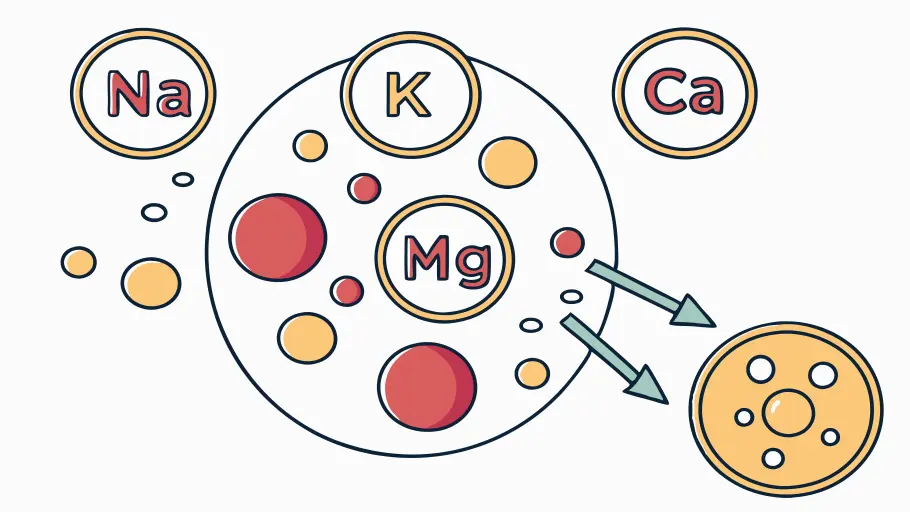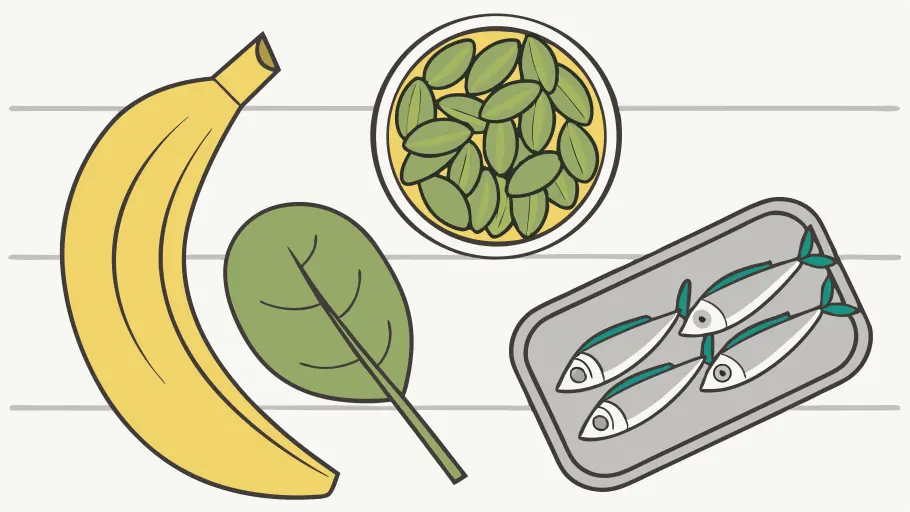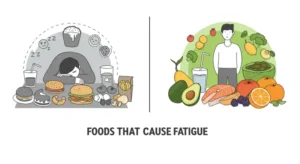Table of Contents
Ever feel wiped out by mid-afternoon despite getting enough sleep? Your energy slump might not be about your morning coffee fading—it could be a sign your body is lacking natural electrolytes for energy. These essential, charged minerals power your body at the cellular level and are vital for sustained energy, yet they’re often overlooked in conversations about quick energy fixes and daily performance.
What Are Electrolytes?
Electrolytes are minerals that, when dissolved in bodily fluids, break down into electrically charged ions. These charged particles allow your cells to generate electrical impulses necessary for countless bodily functions. Without adequate electrolytes, your body simply can’t perform at its peak.
The primary electrolytes include:
- Sodium: Dominates your extracellular fluid, maintaining blood volume and pressure
- Potassium: Rules inside your cells, facilitating enzymatic reactions and membrane potentials
- Calcium: Serves dual roles with 99% stored in bones, while the remainder regulates coagulation, cardiac rhythm, and neurotransmitter release
- Magnesium: Acts as a cofactor in ATP production and muscle relaxation
- Chloride: Works alongside sodium in extracellular fluid while aiding digestion and pH balance
- Phosphate: Crucial for energy storage in ATP molecules
- Bicarbonate: Functions as your body’s primary pH buffer, neutralizing metabolic acids
Your kidneys and hormones like aldosterone and antidiuretic hormone (ADH) work tirelessly to maintain optimal electrolyte concentrations. When this delicate balance gets disrupted—whether from dehydration, excessive sweating, or certain medications—your energy levels are among the first things to suffer.

The Link Between Electrolytes and Energy Levels
The connection between electrolytes and your daily energy isn’t just theoretical—it’s biochemical. Here’s how these minerals directly power your day:
Cellular Energy Production
At the most fundamental level, electrolytes like potassium and magnesium function as cofactors for ATPase enzymes that hydrolyze ATP—your cells’ primary energy currency. Research shows that when potassium levels drop below 3.5 mmol/L (hypokalemia), ATP production decreases significantly, leaving you feeling drained.
Similarly, magnesium deficiency inhibits ATP-dependent processes, including glycolysis and oxidative phosphorylation, by disrupting essential enzyme complexes like pyruvate dehydrogenase. Clinical studies associate hypokalemia with a 40% increase in perceived exertion during moderate exercise, as your cells simply can’t meet energy demands.
Hydration and Energy
Proper hydration isn’t just about water—it’s about electrolyte-balanced fluids. Sodium helps regulate your total body water content, while potassium determines how much fluid stays inside your cells. When this balance gets disrupted, cellular functions slow down, leading to that all-too-familiar brain fog and fatigue. Understanding the benefits of hydration for energy is crucial for maintaining optimal performance throughout your day.
In fact, medical research indicates that hyponatremia (sodium levels below 135 mmol/L) induces cerebral edema as water shifts into neurons, disrupting neurotransmitter synthesis and propagation. Patients report confusion, headaches, and lethargy—a triad indicative of central fatigue.
Nerve and Muscle Function
Every muscle contraction and nerve impulse in your body depends on the proper exchange of electrolytes across cell membranes. Calcium ions mediate excitation-contraction coupling in skeletal muscles by binding to troponin C, which initiates the cross-bridge cycling between actin and myosin filaments.
During prolonged activity, sarcoplasmic reticulum calcium release declines due to ATP depletion and lactic acid accumulation, directly reducing force production. In fatigue-induced states, myoplasmic free calcium concentrations can drop by 30-50%, correlating with decreased contractile force and delayed relaxation.

Key Electrolytes That Influence Energy
While all electrolytes are important, four stand out for their direct impact on your energy levels:
Sodium: The Extracellular Powerhouse
Sodium maintains proper fluid balance outside your cells and enables nerve impulse transmission. Without sufficient sodium, nerve signals weaken, leading to fatigue, confusion, and muscle weakness.
A single hour of intense exercise can deplete up to 13 grams of sodium through sweat, necessitating targeted replenishment to prevent hyponatremia. Athletes with hyponatremia show 15-20% declines in endurance capacity compared to those with normal sodium levels.
Potassium: The Cellular Conductor
Potassium regulates heart rhythm, muscle contractions, and crucially, helps convert glucose into energy your cells can use. Low potassium triggers fatigue, weakness, and even heart palpitations.
When potassium levels drop, your body’s ability to store glycogen (quick energy) diminishes, affecting your physical endurance and mental alertness. Foods rich in potassium like baked potatoes (930mg) and spinach (540mg per 100g) can help maintain optimal levels.
Magnesium: The Energy Catalyst
Magnesium participates in over 300 enzymatic reactions, many directly involved in energy production. It helps convert food into energy, create new proteins, and regulate neurotransmitters that control mood and energy levels.
Magnesium’s role in glucose metabolism further links deficiencies to glycogen depletion and premature fatigue, particularly in endurance athletes. Excellent sources include pumpkin seeds (535mg per 100g) and dark chocolate (228mg per 100g).
Calcium: The Muscle Activator
Beyond building strong bones, calcium initiates muscle contractions and relaxation. Studies show that hypocalcemic patients exhibit prolonged muscle recovery times and heightened susceptibility to exercise-induced injury.
Calcium signaling is so essential that disruptions can cause muscle tremors, spasms, and profound weakness—all energy-draining symptoms. Calcium-rich foods include sardines (382mg per 100g) and kale (150mg per 100g).

Signs of Electrolyte Imbalance That Can Lower Energy
Your body often sends clear signals when electrolyte levels fall out of balance. Understanding these symptoms is essential, especially if you’re experiencing unexplained causes of low energy. Watch for these warning signs:
Fatigue and Muscle Weakness
Perhaps the most common symptom of electrolyte imbalance is unexplained fatigue that doesn’t improve with rest. This occurs because low electrolyte levels directly impair your cells’ ability to generate and use energy.
Dizziness and Brain Fog
Electrolyte imbalances—particularly sodium disruptions—can cause neurological symptoms like dizziness, confusion, and difficulty concentrating. These symptoms occur because proper electrolyte balance is essential for optimal brain function and can contribute to that dreaded afternoon fatigue that disrupts productivity.
Cramps and Irregular Heartbeat
Muscle cramps, particularly in the legs, often signal calcium, magnesium, or potassium imbalances. More seriously, electrolyte disturbances can trigger heart palpitations or irregular heartbeats, as your cardiac muscle depends on precise electrical signaling.
Dehydration Symptoms
Chronic thirst, dry mouth, dark urine, and reduced sweating can all indicate dehydration with accompanying electrolyte imbalances. Remember, proper hydration requires both water and electrolytes.
Causes of Electrolyte Depletion
Understanding what depletes your electrolytes is the first step toward maintaining better energy levels:
Excessive Sweating and Exercise
Intense physical activity causes significant electrolyte loss through sweat. Medical research shows that during heavy exercise, you can lose between 220–1,100 mg of sodium, 140–400 mg of potassium, and 8–60 mg of magnesium per hour, depending on sweat rate and concentration.
Illness
Vomiting and diarrhea rapidly deplete both fluids and electrolytes. Even a short bout of gastrointestinal illness can leave you feeling drained for days afterward due to electrolyte imbalances.
Diuretics, Caffeine, and Alcohol
Diuretic medications increase urination, flushing out electrolytes in the process. Similarly, caffeine and alcohol act as natural diuretics, potentially causing electrolyte imbalances when consumed in excess.
Poor Diet and Insufficient Mineral Intake
Modern processed foods often contain high sodium but lack other essential electrolytes like potassium and magnesium. Following restrictive diets or simply not consuming enough mineral-rich foods can lead to chronic electrolyte deficiencies. It’s also worth noting that certain foods that cause fatigue can exacerbate electrolyte imbalances, creating a double-hit to your energy levels.

How to Replenish Electrolytes for Better Energy
Maintaining optimal electrolyte balance doesn’t require complicated supplements or medical interventions for most people:
Natural Food Sources
Nature provides an abundance of electrolyte-rich foods that can help maintain your energy levels:
- Sodium: Pickled vegetables (1,200 mg/100g), cottage cheese (900 mg/100g)
- Potassium: Baked potato (930 mg), spinach (540 mg/100g)
- Magnesium: Pumpkin seeds (535 mg/100g), dark chocolate (228 mg/100g)
- Calcium: Sardines (382 mg/100g), kale (150 mg/100g)
Integrating these foods into your daily diet provides a steady supply of essential electrolytes without the added sugars or artificial ingredients found in many commercial products.

Electrolyte Drinks: Making Smart Choices
While commercial sports drinks can help replenish electrolytes, many contain excessive sugar and artificial ingredients. Before reaching for that brightly colored bottle, you might want to understand the boost energy drink benefits risks to make an informed choice. Consider these natural alternatives instead:
- Coconut water: Contains approximately 250 mg/L of sodium and 600 mg/L of potassium, making it nature’s sports drink
- Homemade electrolyte solution: Mix 1 liter of water with ¼ teaspoon salt, ¼ teaspoon baking soda, 2 tablespoons honey, and the juice of one lemon or lime
For mild electrolyte replenishment, the World Health Organization’s oral rehydration solution formula (containing 2.6 g/L sodium, 1.5 g/L potassium, and 2.9 g/L citrate) effectively restores balance.
Supplements: When and How to Use Them
For most people, diet alone provides sufficient electrolytes. However, supplements may be beneficial in specific situations:
- During prolonged, intense exercise (especially in hot conditions)
- When recovering from severe illness with vomiting or diarrhea
- For those taking medications that affect electrolyte levels
- During certain medical conditions that impair electrolyte absorption
Always consult a healthcare provider before starting electrolyte supplements, as excessive intake can be just as problematic as deficiency.
When to Prioritize Electrolyte Intake
Certain situations demand extra attention to electrolyte balance:
Before, During, and After Workouts
Athletes should consume 500-700 mg sodium/hour during endurance events via electrolyte tablets or sports drinks. Pre-hydrating with electrolyte-containing fluids before exercise and replenishing afterward helps maintain energy levels and speeds recovery. Combining proper electrolyte balance with best exercises for energy creates a powerful strategy for maximizing your physical and mental performance.
In Hot Climates or When Sweating Heavily
Hot environments increase sweat production and electrolyte loss. If you’re spending time in high temperatures, proactively increasing electrolyte intake can prevent fatigue and more serious heat-related illnesses.
During Illness or Recovery
Gastrointestinal illness rapidly depletes electrolytes. Focused replenishment during and after illness speeds recovery and restores energy levels more quickly.
For People on Keto or Fasting Diets
Low-carbohydrate diets like keto cause increased water and electrolyte excretion, particularly during the initial adaptation phase. Intentional electrolyte supplementation may help combat the “keto flu” and maintain energy levels.
Myths and Misconceptions
Let’s clarify some common misunderstandings about electrolytes and energy:
More Electrolytes = More Energy?
While electrolyte deficiencies certainly cause fatigue, excess electrolytes don’t provide extra energy. In fact, electrolyte imbalances in either direction—too little or too much—can zap your energy. The goal is balance, not maximization.
Too much sodium can lead to water retention and increased blood pressure, while excess potassium can cause dangerous heart arrhythmias. Moderation and balance are key.
Sports Drinks vs. Natural Hydration
Commercial sports drinks often contain unnecessary sugars, artificial colors, and flavors. While they do provide electrolytes, many people overestimate their need for these products during moderate exercise. For most activities under 60-90 minutes, water alone is sufficient. For longer or more intense sessions, electrolyte replacement becomes more important.

Energizing Your Life Through Electrolyte Balance
The connection between electrolytes and energy levels reveals an often-overlooked aspect of health optimization. By understanding how these vital minerals power your cells, muscles, and nerves, you can take control of your daily energy in a new way.
Rather than reaching for another cup of coffee or energy drink when fatigue hits, consider whether your electrolyte balance might need attention. Simple dietary adjustments, proper hydration practices, and situational awareness about when your body needs additional electrolytes can transform your energy levels.
Pay attention to your body’s signals, prioritize electrolyte-rich whole foods, and stay properly hydrated. These simple practices may be the key to unlocking consistent, sustainable energy throughout your day.
Remember, optimal energy isn’t just about getting enough sleep or managing stress—though those factors certainly matter. The microscopic mineral balance in your cells plays an equally important role in how you feel and perform every day.
Are you ready to energize your life through better electrolyte balance?





